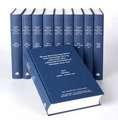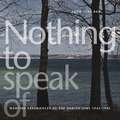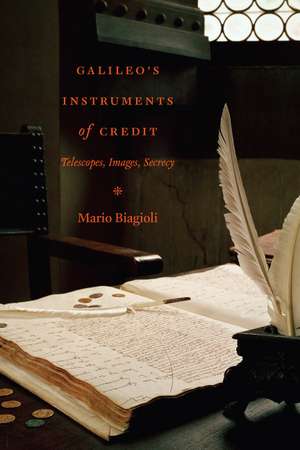Galileo's Instruments of Credit: Telescopes, Images, Secrecy: Emersion: Emergent Village resources for communities of faith
Autor Mario Biagiolien Limba Engleză Hardback – 14 apr 2006
In six short years, Galileo Galilei went from being a somewhat obscure mathematics professor running a student boarding house in Padua to a star in the court of Florence to the recipient of dangerous attention from the Inquisition for his support of Copernicanism. In that brief period, Galileo made a series of astronomical discoveries that reshaped the debate over the physical nature of the heavens: he deeply modified the practices and status of astronomy with the introduction of the telescope and pictorial evidence, proposed a radical reconfiguration of the relationship between theology and astronomy, and transformed himself from university mathematician into court philosopher.
Galileo's Instruments of Credit proposes radical new interpretations of several key episodes of Galileo's career, including his early telescopic discoveries of 1610, the dispute over sunspots, and the conflict with the Holy Office over the relationship between Copernicanism and Scripture. Galileo's tactics during this time shifted as rapidly as his circumstances, argues Mario Biagioli, and the pace of these changes forced him to respond swiftly to the opportunities and risks posed by unforeseen inventions, further discoveries, and the interventions of his opponents.
Focusing on the aspects of Galileo's scientific life that extend beyond the framework of court culture and patronage, Biagioli offers a revisionist account of the different systems of exchanges, communication, and credibility at work in various phases of Galileo's career. Galileo's Instruments of Credit will find grateful readers among scholars of science studies, historical epistemology, visual studies, Galilean science, and late Renaissance astronomy.
Galileo's Instruments of Credit proposes radical new interpretations of several key episodes of Galileo's career, including his early telescopic discoveries of 1610, the dispute over sunspots, and the conflict with the Holy Office over the relationship between Copernicanism and Scripture. Galileo's tactics during this time shifted as rapidly as his circumstances, argues Mario Biagioli, and the pace of these changes forced him to respond swiftly to the opportunities and risks posed by unforeseen inventions, further discoveries, and the interventions of his opponents.
Focusing on the aspects of Galileo's scientific life that extend beyond the framework of court culture and patronage, Biagioli offers a revisionist account of the different systems of exchanges, communication, and credibility at work in various phases of Galileo's career. Galileo's Instruments of Credit will find grateful readers among scholars of science studies, historical epistemology, visual studies, Galilean science, and late Renaissance astronomy.
Din seria Emersion: Emergent Village resources for communities of faith
-
 Preț: 185.37 lei
Preț: 185.37 lei - 9%
 Preț: 352.50 lei
Preț: 352.50 lei -
 Preț: 307.53 lei
Preț: 307.53 lei -
 Preț: 115.82 lei
Preț: 115.82 lei -
 Preț: 126.25 lei
Preț: 126.25 lei -
 Preț: 279.55 lei
Preț: 279.55 lei -
 Preț: 183.89 lei
Preț: 183.89 lei -
 Preț: 115.53 lei
Preț: 115.53 lei - 8%
 Preț: 360.28 lei
Preț: 360.28 lei -
 Preț: 208.31 lei
Preț: 208.31 lei - 18%
 Preț: 502.35 lei
Preț: 502.35 lei -
 Preț: 182.98 lei
Preț: 182.98 lei -
 Preț: 138.26 lei
Preț: 138.26 lei - 8%
 Preț: 563.24 lei
Preț: 563.24 lei -
 Preț: 216.89 lei
Preț: 216.89 lei -
 Preț: 167.85 lei
Preț: 167.85 lei -
 Preț: 179.04 lei
Preț: 179.04 lei -
 Preț: 229.92 lei
Preț: 229.92 lei -
 Preț: 156.84 lei
Preț: 156.84 lei - 8%
 Preț: 346.31 lei
Preț: 346.31 lei -
 Preț: 94.22 lei
Preț: 94.22 lei - 18%
 Preț: 348.59 lei
Preț: 348.59 lei -
 Preț: 133.99 lei
Preț: 133.99 lei -
 Preț: 176.49 lei
Preț: 176.49 lei -
 Preț: 101.43 lei
Preț: 101.43 lei -
 Preț: 146.50 lei
Preț: 146.50 lei -
 Preț: 208.54 lei
Preț: 208.54 lei -
 Preț: 67.35 lei
Preț: 67.35 lei -
 Preț: 120.81 lei
Preț: 120.81 lei -
 Preț: 144.99 lei
Preț: 144.99 lei -
 Preț: 215.51 lei
Preț: 215.51 lei - 18%
 Preț: 2261.34 lei
Preț: 2261.34 lei -
 Preț: 125.41 lei
Preț: 125.41 lei -
 Preț: 160.63 lei
Preț: 160.63 lei - 9%
 Preț: 352.77 lei
Preț: 352.77 lei -
 Preț: 106.35 lei
Preț: 106.35 lei -
 Preț: 273.93 lei
Preț: 273.93 lei - 12%
 Preț: 290.56 lei
Preț: 290.56 lei -
 Preț: 548.71 lei
Preț: 548.71 lei -
 Preț: 138.81 lei
Preț: 138.81 lei -
 Preț: 145.41 lei
Preț: 145.41 lei - 6%
 Preț: 324.95 lei
Preț: 324.95 lei - 9%
 Preț: 353.24 lei
Preț: 353.24 lei -
 Preț: 403.70 lei
Preț: 403.70 lei -
 Preț: 203.53 lei
Preț: 203.53 lei - 8%
 Preț: 311.68 lei
Preț: 311.68 lei -
 Preț: 144.80 lei
Preț: 144.80 lei -
 Preț: 302.76 lei
Preț: 302.76 lei -
 Preț: 163.52 lei
Preț: 163.52 lei
Preț: 564.99 lei
Preț vechi: 614.12 lei
-8% Nou
Puncte Express: 847
Preț estimativ în valută:
108.11€ • 113.11$ • 89.81£
108.11€ • 113.11$ • 89.81£
Carte disponibilă
Livrare economică 12-26 martie
Livrare express 26 februarie-04 martie pentru 34.87 lei
Preluare comenzi: 021 569.72.76
Specificații
ISBN-13: 9780226045610
ISBN-10: 0226045617
Pagini: 316
Ilustrații: 16 halftones, 3 line art
Dimensiuni: 152 x 229 x 23 mm
Greutate: 0.57 kg
Editura: University of Chicago Press
Colecția University of Chicago Press
Seria Emersion: Emergent Village resources for communities of faith
ISBN-10: 0226045617
Pagini: 316
Ilustrații: 16 halftones, 3 line art
Dimensiuni: 152 x 229 x 23 mm
Greutate: 0.57 kg
Editura: University of Chicago Press
Colecția University of Chicago Press
Seria Emersion: Emergent Village resources for communities of faith
Notă biografică
Mario Biagioli is professor of history of science at Harvard University and the author of Galileo, Courtier: The Practice of Science in the Culture of Absolutism, also published by the University of Chicago Press.
Cuprins
List of Illustrations
Abbreviations
Introduction. From Brass Instruments to Textual Supplements
1. Financing the Aura: Distance and the Construction of Scientific Authority
2. Replication or Monopoly?: The Medicean Stars between Invention and Discovery
3. Between Risk and Credit: Picturing Objects in the Making
4. The Supplemental Economy of Galileo’s Book of Nature
Epilogue. Unintended Differences
Acknowledgments
References
Index
Abbreviations
Introduction. From Brass Instruments to Textual Supplements
1. Financing the Aura: Distance and the Construction of Scientific Authority
2. Replication or Monopoly?: The Medicean Stars between Invention and Discovery
3. Between Risk and Credit: Picturing Objects in the Making
4. The Supplemental Economy of Galileo’s Book of Nature
Epilogue. Unintended Differences
Acknowledgments
References
Index
Recenzii
“Biagioli’s new book holds its own next to the ground breaking Galileo, Courtier. Here, Biagioli explores two main categories—economy and distance—allowing the reader to dig deeply into the motifs and psychomotorics of Galileo’s strategies. Never before have Galileo's visual tools been examined side-by-side with the scientific and social impacts of his strategies as inventor, discoverer, and architect of his own success. Biagioli’s writing is elegant and, as ever, enriched by enlightening contradictions that add a literary touch. Once again, a masterpiece.”
“Once more Mario Biagioli has upended conventional views of the sociology of scientific knowledge. In Galileo’s Instruments of Credit he offers a marvelous account of how Galileo packaged his discoveries, and of his complex and often risky strategies for increasing his credit and authority. From Biagioli’s groundbreaking discussion of Galileo’s use of visual representation to his unpacking of the great scientist’s metaphor of the book of the universe, this is a revolutionary and unforgettable contribution to the history of science.”
“With his well known and inimitable ingenuity, Mario Biagioli effortlessly but skillfully pours new interpretive wine into old factual bottles. The result is a well-documented and well-argued interpretation of Galileo’s crucial years that stresses the probative force of his visual representations and the metaphorical suggestiveness of economic categories. Whether or not one accepts Biagioli’s interpretation, specialists will have to take it into account, and generalists will be able to read it with profit.”
“Inventive. Supple. Responsive to local conditions. Imaginative. Opportunistic. . . Do these terms apply to Galileo’s self-fashioning in the vexed world of early seventeenth-century Italy or to Mario Biagioli’s masterful study of the master-manipulator of credit? To both, of course. This fascinating, richly documented tale of the intersection of early print culture and science will challenge and delight all readers interested in the ways that belief must be generated in order for truth to exist.”
“Biagioli established his repute in the field with an important work on Galileo’s enterprises in Florence and Rome, Galileo Courtier, a decade ago. Galileo’s Instruments of Credit is a remarkable and impressive set of discussions of crucial episodes in the history of modern sciences.”
“As Biagioli has previously shown, Galileo’s science was not done in a social and institutional vacuum. In this book, Biagioli expands his scope, examining metaphors of nature, the uses of pictorial evidence, and ideas about intellectual property and scientific authority within the context of the shifting rhetorical strategies Galileo employed in his battle for the emerging new science.”
"In 1609, while he was professor of mathematics at Padua in Italy, and in his mid-40s, Galileo Galilei heard of the invention of the telescope by Hans Lippershey and constructed a vastly improved version with lenses that he ground himself. Within six years, the astronomical discoveries he made with it took him from being an unknown mathematics professor running a student boarding house to a star of the court of the Medici in Florence, where he soon found himself at the receiving end of unwelcome attention from the Inquisition. Biagioli reinterprets key episodes of Galileo's career and shows how his tactics rapidly shifted to match his changing circumstances. His study presents a fresh and interesting view of the challenges faced by the 17th century scientist."
"Galileo’s Instruments of Credit is worth reading, both to see where studies of Galileo are going and to understand the uneasy but always interesting relationship between the history of science and contemporary science studies.... offers a number of interesting insights into how to understand the uses of instruments and images in early modern science."
"Throughout Biagioli displays his inimitable ingenuity and his interpretive prowess to say things that are always original, insightful, and interesting. The result is a well-documented and well-argued interpretation of Galileo's crucial years."
"Biagioli combines careful empirical investigations and an on-going dialogue with theoretical issues. . . . An important contribution to Galilean studies, to issues of credit and authorship, and to broader issues relevant to the history of science and the investigation of knowledge production."
"Biagioli has produced a complex and compelling account of the discoveries and debates of these crucial years."
"What Biagioli achieves is a revitalization of interpretive approaches to matters that we thought we understood."
"Readers interested in Galileo, the history of astronomy, and how economic circumstances and implications affect how and why discoveries are revealed will find this book to be intriguing reading."
